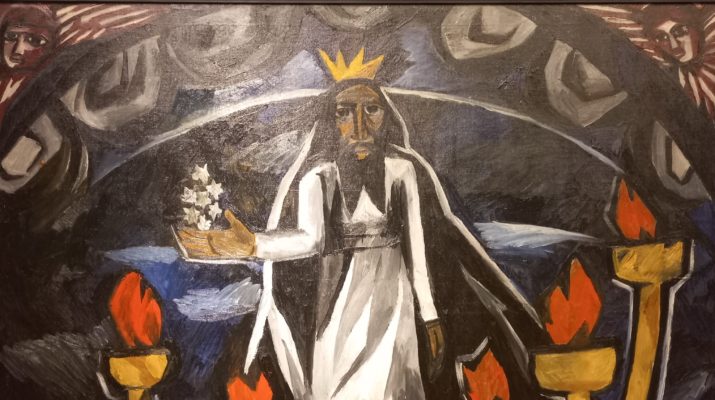Mark 13:24-37
First Sunday of Advent B
24 “But in those days,I after that suffering,II
the sunIII will be darkened,IV
I “days” = hemera. Perhaps from hemai (to sit). This is day, time, or daybreak.
II “suffering” = thlipsis. From thlibo (to press in on and make narrow, rub together, constrict; figuratively to oppress or afflict). This is pressure that hems us in – used often of internal pressure that makes us feel like we have no other options and are confined or restricted. So, this is persecution, affliction, trouble, distress, and anguish. There is a different word, stenoxoria, that refers to external pressure that we feel from what’s going on.
III “sun” = helios. This is sun, which would imply light in general or the east.
IV “darkened” = skotizo. 5x in NT. From skotos (darkness literal or figurative – as moral or spiritual darkness, sin and what comes from it; obscurity); from skia (shadow, thick darkness, outline; figurative for a spiritual situation that is good or bad). This is to darken or obscure in a literal or figurative sense.
and the moonV will not giveVI its light,VII
V “moon” = selene. 9x in NT. From selas (bright flame). This is moon as bright.
VI “give” = didomi. To give, offer, place, bestow, deliver. This is give in a literal or figurative sense.
VII “light” = pheggos. 2x in NT. Perhaps from phos (light, a source of light, fire, or radiance; light with specific reference to what it reveals; luminousness whether natural or artificial, abstract or concrete, literal or figurative); from phao (to shine) or from the same as phaino (to bring light, cause to appear, shine, become visible or clear). This is light, splendor, radiance.
25 and the starsVIII will beIX fallingX from heaven,XI
and the powersXII in the heavens will be shaken.XIII
VIII “stars” = aster. Perhaps from stronnumi (to spread, furnish, strew). This is a star in a literal or figurative sense.
IX “be” = eimi. This is to be, exist.
X “falling” = pipto. This is to fall literally or figuratively.
XI “heaven” = ouranos. May be related to oros (mountain, hill); probably related to airo (raise, take up, lift, remove). This is the air, the sky, the atmosphere, and heaven. It is the sky that is visible and the spiritual heaven where God dwells. Heaven implies happiness, power, and eternity.
XII “powers” = dunamis. From dunamai (to be able, have power or ability). This is might, strength, physical power, efficacy, energy, and miraculous power. It is force literally or figuratively – the power of a miracle or the miracle itself.
XIII “shaken” = saleuo. 15x in NT. From salos (tossing, agitation, rolling – like the sea swells). This is to agitate or shake up. It can mean to disturb, topple, incite, or destroy.
26 “Then they will seeXIV ‘the SonXV of ManXVI
XIV “see” = horao. To see, perceive, attend to, look upon, experience. Properly, to stare at and so implying clear discernment. This, by extension, would indicate attending to what was seen and learned. This is to see, often with a metaphorical sense. Can include inward spiritual seeing.
XV “Son” = huios. This is son, descendant – a son whether natural born or adopted. It can be used figuratively for other forms of kinship.
XVI “Man” = anthropos. Related to “see” in v26. Probably from aner (man, male, husband) + ops (eye, face); {from optanomai (to appear, be seen); perhaps from horao (see note XIV above)}. This is human, humankind. Used for all genders.
comingXVII in clouds’XVIII with greatXIX power and glory.XX
XVII “coming” = erchomai. This is to come or go.
XVIII “clouds” = nephele. From nephos (cloud; figurative for a great crowd or multitude). This is cloud or cloudiness.
XIX “great” = polus. This is much, often, plenteous – a large number or a great extent.
XX “glory” = doxa. From dokeo (to have an opinion, seem, appear, suppose; a personal judgment; to think); from dokos (opinion). This is literally something that evokes a good opinion – something that connects to our understanding of intrinsic worth. The ultimate expression of this is, of course, God and God’s manifestation. So, this is opinion, honor, and dignity, but also praise, glory, renown, and worship.
27 Then he will send outXXI the angelsXXII and gatherXXIII the electXXIV
XXI “send out” = apostello. From apo (from, away from) + stello (to send, set, arrange, prepare, gather up); {probably from histemi (to make to stand, stand, place, set up, establish, appoint, stand firm, be steadfast)}. This is to send forth, send away, dismiss, send as a messenger. It implies one that is sent for a particular mission or purpose rather than a quick errand. This is where “apostle” comes from.
XXII “angels” = aggelos. Probably from ago (to lead, bring, carry, guide) + agele (flock, herd, drove); {also from ago (see above)}. This is angel or messenger. Properly, it is one sent with news or to perform a specific task. This messenger can be human or an angel from heaven. More commonly, it is used for angels in the New Testament.
XXIII “gather” = episunago. Related to “angels” in v27. 8x in NT– all in the Gospels, including Jesus’s lament to gather the people together as a hen gathers her brood. From epi (on, upon, what is fitting) + sunago (to lead together and so to assemble, bring together, welcome with hospitality, or entertain); {from sun (with, together with, closely associated) + ago (see note XXII above)}. This is to gather, assembly. It is to come together for a reason.
XXIV “elect” = eklektos. From eklego (to choose, select, elect); {from ek (from, from out of) + lego (to speak, tell, mention)}. This is to select or choose. It is making a personal choice – a favorite.
from the fourXXV winds,XXVI from the endsXXVII of the earthXXVIII to the ends of heaven.
XXV “four” = tessares. This is four – used figuratively for total coverage.
XXVI “winds” = anemos. From aer (air that we breathe); from aemi (to breathe or blow). This is wind or a gust of air. It can also be used figuratively for empty doctrines.
XXVII “ends” = akron. 6x in NT. Related to akantha (thorn bush, thorn); from ake (point, edge). This is end, tip, top, extreme.
XXVIII “earth” = ge. This is earth, land, soil, region, country, the inhabitants of an area.
28 “From the fig treeXXIX learnXXX its lesson:XXXI
XXIX “fig tree” = suke. 16x in NT. From sukon (a ripe fig). This is a fig tree, whether it’s wild or part of an orchard.
XXX “learn” = manthano. This is to learn, ascertain, understand. It is knowledge that one gets from personal experience and it implies reflecting on that experience. It can also focus on gaining knowledge by learning facts. This root is where the Greek word for disciple comes from (mathetes).
XXXI “lesson” = parabole. From paraballo (literally to throw beside, compare, arrive, liken); {from para (by, beside, in the presence of) + ballo (to throw, cast, place, put, drop)}. This is a parable, comparison, adage. Quite often a tale told or a metaphor to establish a point, but it could be a true story.
as soon as its branchXXXII becomesXXXIII tenderXXXIV and puts forthXXXV
XXXII “branch” = klados. 11x in NT. From klao (to break in pieces as one breaks bread). This is a branch, twig, or bough. It can also refer to descendants.
XXXIII “becomes” = ginomai. This is to come into being, to happen, become, be born. It can be to emerge from one state or condition to another or is coming into being with the sense of movement or growth.
XXXIV “tender” = hapalos. 2x in NT. This is tender or soft.
XXXV “puts forth” = ekphuo. 2x in NT. From ek (from, from out of) + phuo (to produce, spring up, grow, germinate; perhaps originally meaning puff or blow). This is to put forth or sprout.
its leaves,XXXVI you knowXXXVII that summerXXXVIII is near.XXXIX
XXXVI “leaves” = phullon. Perhaps related to “puts forth” in v28. 6x in NT. Perhaps from the same as phule (clan, tribe, lineage); {from phuo (see note XXXV above). This is a sprout or a leaf.
XXXVII “know” = ginosko. This is to know, recognize, realize, perceive, learn. It is knowledge gained through personal experience.
XXXVIII “summer” = theros. 3x in NT. From thero (to heat). This is properly heat so it refers to the summer.
XXXIX “near” = eggus. Perhaps from agcho (to squeeze). This is nearby or near in time.
29 So also, when you see these things taking place,XL you know that he is near, at the very gates.XLI 30 TrulyXLII I tellXLIII you,
XL “taking place” = ginomai. Same as “becomes” in v28. See note XXXIII above.
XLI “gates” = thura. This is opening or closure so it’s a door, gate, or entrance. Figuratively, this can refer to an opportunity.
XLII “truly” = amen. From Hebrew amen (verily, truly, amen, truth, so be it, faithfulness); from aman (to believe, endure, fulfill, confirm, support, be faithful, put one’s trust in, be steadfast. Figuratively, this is to be firm, steadfast, or faithful, trusting, believing, being permanent, morally solid). This word is literally firmness, but figuratively fidelity, faithfulness, honesty, responsibility, trust, truth, steadfastness. Properly, it is to be sure, certain, or firm. This is a word of emphasis indicating that something crucial follows.
XLIII “tell” = lego. Related to “elect” in v27. See note XXIV above.
this generationXLIV will not pass awayXLV until allXLVI these things have taken place. 31 Heaven and earth will pass away, but my wordsXLVII will not pass away.
XLIV “generation” = genea. Related to “becomes” in v28. From genos (family, offspring, kin – in a literal or figurative sense); from ginomai (see note XXXIII above). This is family, generation, kind, or nation. As generation, it implies an age as a period of time. It can also mean infinity. This is the root of the word “generation.
XLV “pass away” = parerchomai. Related to “coming” in v26. From para (from beside, by) + erchomai (see note XVII above). This is pass by, neglect, disregard. Figuratively, it can mean to perish or to become void.
XLVI “all” = pas. This is all or every.
XLVII “words” = logos. Related to “elect” in v27 & “tell” in v30. From lego (see note XXIV above). This is word, statement, speech, analogy. It is a word that carries an idea or expresses a thought, a saying. It could refer to a person with a message or reasoning laid out in words. By implication, this could be a topic, line of reasoning, or a motive. It can be used for a divine utterance or as Word – Christ.
32 “But about that day or hourXLVIII no one knows,XLIX neither the angels in heaven nor the Son, but only the Father.L
XLVIII “hour” = hora. This is a set time or period, an hour, instant, or season. This is where the word “hour” comes from.
XLIX “knows” = eido. This is to know, consider perceive, appreciate, behold, or remember. It means seeing with one’s eyes, but also figuratively, it means perceiving – seeing that becomes understanding. So, by implication, this means knowing or being aware.
L “Father” = pater. This is father in a literal or figurative sense. Could be elder, senior, ancestor, originator, or patriarch.
33 Beware,LI keep alert,LII for you do not knowLIII
LI “beware” = blepo. This is literally to see – it is primarily used in the physical sense. However, figuratively it can be seeing, which includes attention and so to watchfulness, being observant, perceiving, and acting on the visual information. It can also mean beware.
LII “keep alert” = agrupneo. Related to “angels” and “gather” in v27. 4x in NT. From agreuo (to capture or trap, to hunt); {from agra (a hunting or catch); probably related to agros (a field as a place where one grows crops or pastures cattle; a farm or lands); or from ago (see note XXII above)} + hupnos (sleep – literal or figurative); {perhaps from hupo (by, under, about, subordinate to)} OR from a (not, without) + hupnos (see above). This is awake, not asleep, vigilant, alert.
LIII “know” = eido. Same as “knows” in v32. See note XLIX above.
when the timeLIV will come.LV 34 It is like a man going on a journey,LVI when he leavesLVII homeLVIII
LIV “time” = kairos. This is season, opportunity, occasion. The word chronos is used for chronological time. Kairos is used for spiritually significant time – the right time or appointed time.
LV “come” = eimi. Same as “be” in v25. See note IX above.
LVI “going on a journey” = apodemos. 1x in NT. From apo (from, away from) + demos (district, multitude, rabble, assembly; Greeks bound by similar laws or customs); {from deo (to tie, bind, compel; declare unlawful)}. This is to go abroad or travel from home.
LVII “leaves” = aphiemi. From apo (from, away from) + hiemi (to send). This is send away, release, permit, forgive, allow to depart, discharge, or send forth.
LVIII “home” = oikia. From oikos (house – the building, the household, the family, descendants; the temple). This is a house, household, goods, property, family, or means.
and putsLIX his slavesLX in charge,LXI
LIX “puts” = didomi. Same as “give” in v24. See note VI above.
LX “slaves” = doulos. Related to “going on a journey” in v34. Perhaps from deo (see note LVI above). This is used for a servant or for a slave, enslaved. It refers to someone who belongs to someone else. But, it could be voluntary (choosing to be enslaved to pay off debt) or involuntary (captured in war and enslaved). It is used as a metaphor for serving Christ. Slavery was not inherited (i.e. the children of slaves were not assumed to be slaves) and slaves could buy their way to freedom. Slavery was generally on a contractual basis (that is for the duration of how long it took you to pay your debt and/or save up enough money to buy your freedom).
LXI “charge” = exousia. Related to “be” in v25. From exesti (to be permitted or lawful); {from ek (out, out of) + eimi (see note IX above)}. This is power to act or weight. It especially denotes moral authority or influence. It can mean domain, liberty, freedom, capacity, mastery, right, force, or strength.
eachLXII with his work,LXIII and commandsLXIV the doorkeeperLXV to be on the watch.LXVI
LXII “each” = hekastos. Perhaps from hekas (separate). This is each one, any, every. It is every individual as a distinct entity as opposed to those counted as a group in small sets.
LXIII “work” = ergon. From ergo (to work, accomplish, do). This is work, task, deed, labor, effort.
LXIV “commands” = entellomai. 15x in NT. From en (in, on, at, by, with) + tellomai (to accomplish); {related to telos (end, event, purpose, consummation)}. This is to charge or command – focuses on the final objective. So, this is looking at the final outcome of the command – how things will end up.
LXV “doorkeeper” = thuroros. Related to “gates” in v29. 4x in NT. From thura (see note XLI above) + ouros (guardian). This is gate warden or porter.
LXVI “be on the watch” = gregoreo. From egeiro (to awake, raise up or lift up; to get up from sitting or lying down, to get up from sleeping, to rise from a disease or from death; figuratively, rising from inactivity or from ruins). This is to be or stay awake, watch. Figuratively, it can be alertness or vigilance.
35 Therefore, keep awake,LXVII for you do not knowLXVIII when the masterLXIX of the house will come,LXX
LXVII “keep awake” = gregoreo. Same as “be on the watch” in v34. See note LXVI above.
LXVIII “know” = eido. Same as “knows” in v32. See note XLIX above.
LXIX “master” = kurios. From kuros (authority, supremacy). This is a respectful address meaning master or sir. It refers to one who has control or power greater than one’s own. So, it was also applied to God and Jesus as Master or Lord.
LXX “come” = erchomai. Same as “coming” in v26. See note XVII above.
in the eveningLXXI or at midnightLXXII or at cockcrowLXXIII or at dawn,LXXIV
LXXI “evening” = opse. 3x in NT. From opiso (back, behind, after); from the p same as opisthen (after, back, from the rear); probably from opis (back). This is after, late, in the end, in the evening.
LXXII “midnight” = mesonuktion. 4x in NT. From mesonuktios (at midnight); {from mesos (middle, among, center); {from meta (with among, behind, beyond; implies a change following contact or action)} + nux (night in a literal or figurative sense)}. This is at midnight – the middle watch of the night.
LXXIII “cockcrow” = alektorophonia. Perhaps related to “light” in v24. 1x in NT. From alektor (to ward off); {perhaps from aleko (to ward off)} + phone (voice, sound, tone or noise; also a language or dialect); {probably from phemi (to declare, say, use contrasts in speaking to shed light on one point of view); {from phao (see note VII above) or phaino (see note VII above)}}. This is the time when the rooster crows – after midnight and before thee in the morning.
LXXIV “dawn” = proi. 12x in NT. From pro (before, earlier than, ahead, prior). This is early, at dawn, during the daybreak watch.
36 or else he may findLXXV you asleepLXXVI when he comesLXXVII suddenly.LXXVIII 37 And what I sayLXXIX to you I say to all: Keep awake.”
LXXV “find” = heurisko. This is to find, learn, or obtain. It is to discover something, which generally implies a period of searching for it. This is to find in a literal or figurative sense. This is where the word “heuristic” comes from.
LXXVI “asleep” = katheudo. From kata (down, against, throughout, among) + heudo (to sleep). This is to settle down to rest, to sleep, fall asleep in a literal or figurative sense.
LXXVII “comes” = erchomai. Same as “coming” in v26. See note XVII above.
LXXVIII “suddenly” = exaiphnes. Perhaps related to “light” in v24 & “cockcrow” in v35. 5x in NT. From ek (from, from out of) + aiphnidios (literally not apparent so sudden or unexpected); {from aiphnes (suddenly); {from a (not, without) + phaino (see note VII above)}. This is suddenly or unexpectedly.
LXXIX “say” = lego. Same as “tell” in v30. See note XLIII above.
Image credit: “Vision of the Seven Candlesticks” by Natalya Sergeevna Goncharova, 2010. Photo by shakko, 2022.




